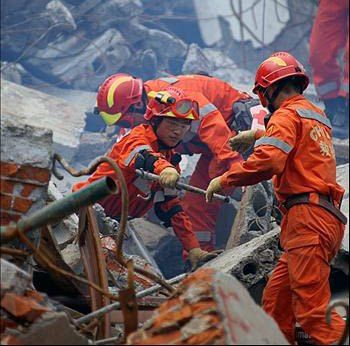Slouching Towards Statism
I can find no better illustration of the Statist form than this clip of a Chinese small truck undergoing a 40 mpg front-end crash test. It's just 33 seconds long, so do click it (and excuse the oddly constructed note at the end).
This is undeniable evidence of what happens when production is put into the hands of a Statist government. China's government certainly had access to car safety technology -- it's stolen all sorts of other technology, after all -- but it willfully decided to keep the cost down in order to advance the state's goal of moving goods cheaply in order to expand the economy. (Notice how the goods being carried probably suffered little ill effect -- something that can't be said of the human occupants?)
 In America a few years ago, Ford Explorers began to roll over because Ford was recommending too low a tire pressure in order to offset the top-heavy nature of the Explorer's design. Compared to the Chinese truck, this was a less willful act -- executives didn't foresee deaths, but almost 300 died and 700 were injured. (That stat has to be compared to the 12,000 SUV rollover deaths and injuries in other SUVs before any blame can be ascribed specifically to Ford's Explorer team.)
In America a few years ago, Ford Explorers began to roll over because Ford was recommending too low a tire pressure in order to offset the top-heavy nature of the Explorer's design. Compared to the Chinese truck, this was a less willful act -- executives didn't foresee deaths, but almost 300 died and 700 were injured. (That stat has to be compared to the 12,000 SUV rollover deaths and injuries in other SUVs before any blame can be ascribed specifically to Ford's Explorer team.)As a result of this, Ford was targeted for lawsuits and the Explorer fell from its perch as the #1 selling SUV to near oblivion.
No stats are available for deaths in the Chinese truck, but obviously if it had been as popular in the US as the Explorer was, and was operated at US highway speeds, its death count would have been spectacularly morbid. But what choice do the citizens of Statist China have? The nation manufactures all their automotive options (and the others are just as bad; see clips here, here, here, here.) And Chinese citizens certainly can't sue their government.
 China's Statist mindset was also evident in the recent earthquake, where the collapse of schools and possible collapse of dams is more evidence that the state was more interested in taking care of its business than it was in taking care of its people.
China's Statist mindset was also evident in the recent earthquake, where the collapse of schools and possible collapse of dams is more evidence that the state was more interested in taking care of its business than it was in taking care of its people.Contrast that to Individualist America. When earthquakes hit or tornadoes threaten, where are we told to evacuate to? Schools. To us, protecting the next generation is our tantamount goal. To China, it is merely to educate them. (We could use a bit more emphasis on education, however ...)
Last week, we helped one of our water district clients win regulatory approval of a 266-million-gallon earth dam reservoir just up-valley from a high school. There wasn't a peep of protest, despite an extensive outreach campaign to inform the public. Why? Because people here have cause to trust our dam construction techniques and our government's watchful control. Why? Because they don't have any experience with dam collapses, since collapses are so rare.
Do you think the Chinese government would have carried out an outreach campaign? Would they give the Chinese people a voice in the decision-making, or would they just slap a shoddy dam wherever they wanted? The weak, threatening dams throughout the earthquake zone give us our answer.
One last example. When the Three Mile Island nuclear power plant failed, thanks to our Individualist state's reams of regulations designed to protect the public no matter the expense, no one was injured. Some radioactive gas was released; it dissipated; that was it.
 In Statist Russia, where nuclear power plant technology was developed to speed production of power to feed Soviet industry, not to protect the Soviet citizens, when a failure hit the Chernobyl plant, there weren't the same safeguards:
In Statist Russia, where nuclear power plant technology was developed to speed production of power to feed Soviet industry, not to protect the Soviet citizens, when a failure hit the Chernobyl plant, there weren't the same safeguards:All the Chernobyl reactors were of a design that the Russians call the RBMK--natural uranium-fueled, water-cooled, graphite-moderated--a design that American physicist and Nobel laureate Hans Bethe has called "fundamentally faulty, having a built-in instability." Because of the instability, an RBMK reactor that loses its coolant can under certain circumstances increase in reactivity and run progressively faster and hotter rather than shut itself down. Nor were the Chernobyl reactors protected by containment structures like those required for U.S. reactors, though they were shielded with heavy concrete covers. ...Such is the nature of radiation that we will never really know how many people were killed by the Soviet Statists. In 2006, the World Health Organization estimated up to 9,000 people died or will die of cancer because of the incident. The International Agency for Research on Cancer, an agency governed by the WHO and 16 member nations, published an estimate of 6,700 to 38,000 in a peer-reviewed journal. Greenpeace came up with 93,000 to 200,000, an overestimation typical of environmental hysteria cultists. (source)No commercial reactor in the United States is designed anything like the RBMK reactor. Cohen summarizes several of the differences:
1. A reactor which is unstable against a loss of water could not be licensed in the United States.
2. A reactor which is unstable against a temperature increase could not be licensed here.
3. A large power reactor without a containment [structure] could not be licensed here. (source)
But what of America's nuclear weapons tests in the atmosphere over Nevada and Utah -- were we behaving as a Statist nation? There were obvious strains of Statism in the decision to test bombs there, driven by heightened Statism that occurs during times of external threats to the nation. But there were also two arguments countering Statism in the testing: First, the nation picked the most remote, unpopulated part of the nation for the test, which reflects concern for the individual, and second, we didn't really know what we were messing with -- unlike the Soviets who made a willful decision in the design of Chernobyl.
 I could go on: Katrina vs. Myanmar, hot weather deaths in Paris vs. St. Louis, or the poor Chinese school kids who died when the fireworks they were required by the state to manufacture during school exploded. But the case has been made. Putting the government first is bad for the health, welfare and happiness of the people.
I could go on: Katrina vs. Myanmar, hot weather deaths in Paris vs. St. Louis, or the poor Chinese school kids who died when the fireworks they were required by the state to manufacture during school exploded. But the case has been made. Putting the government first is bad for the health, welfare and happiness of the people.And yet, there are factions in the US -- let's call them Democrats -- who want to give more power to the state. They want the state in control of education, health care, what we eat (fat bans in Dem stronghold of NYC), what we hear (the renewed Fairness Doctrine debate), how marriage is to be defined.
Despite myriad examples of what happens when power is taken away from the people, they press on towards greater and greater collectivism. And they're winning.
 The zenith of conservatism -- the Individualist state -- in the modern era was reached in either the 50s or the 80s depending on your perspective. Since then, America has been sliding over our protests towards collectivist Statism.
The zenith of conservatism -- the Individualist state -- in the modern era was reached in either the 50s or the 80s depending on your perspective. Since then, America has been sliding over our protests towards collectivist Statism.There will be no improvement in the short term since all three remaining presidential candidates (Is Hillary still remaining? I haven't checked in the last hour.) are all more Statist than Individualist, and Congress should be firmly in the control of the Statists for at least one more election cycle. I'm a believer in pendulum swings, and I trust America will come up with another Reagan at some point ... but the question is, how much irreversible damage will be done before that occurs?
Labels: Conservatism, Government, Individualist, Leftism, Statist




<< Home